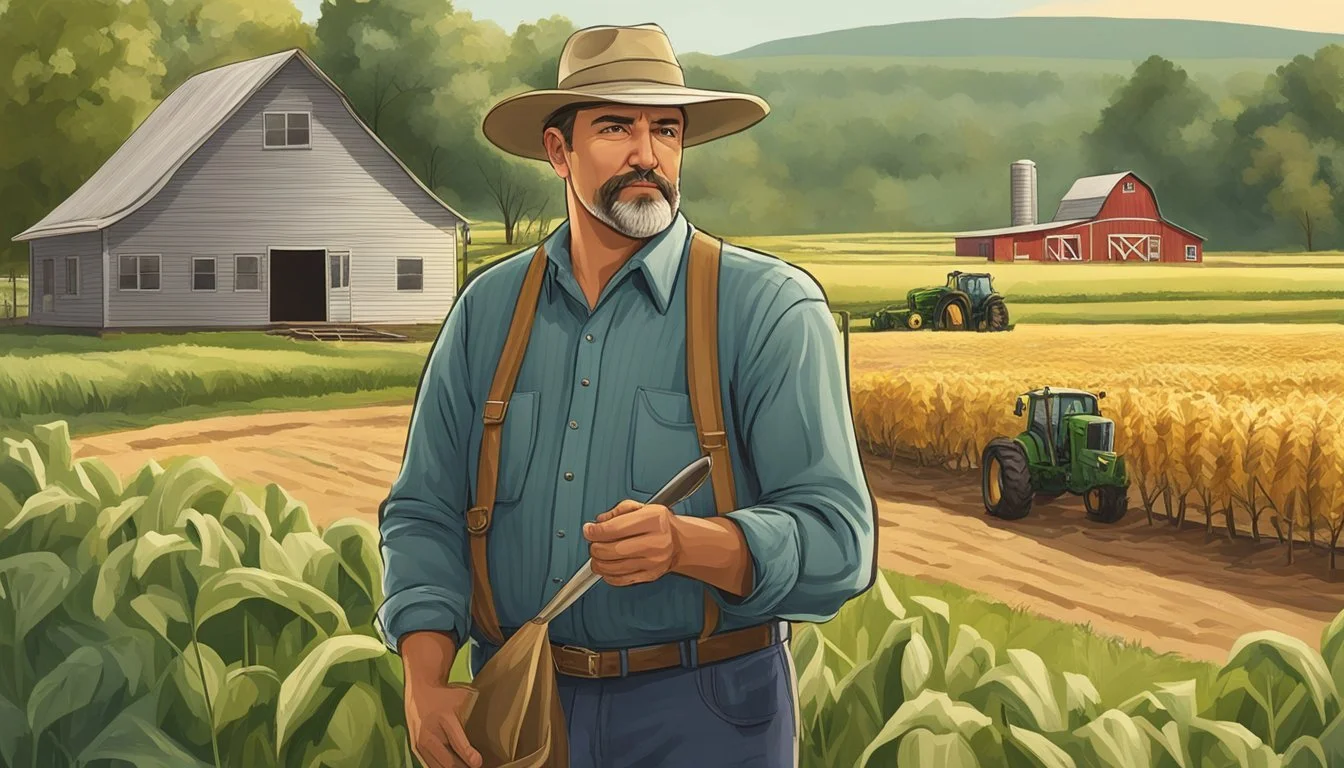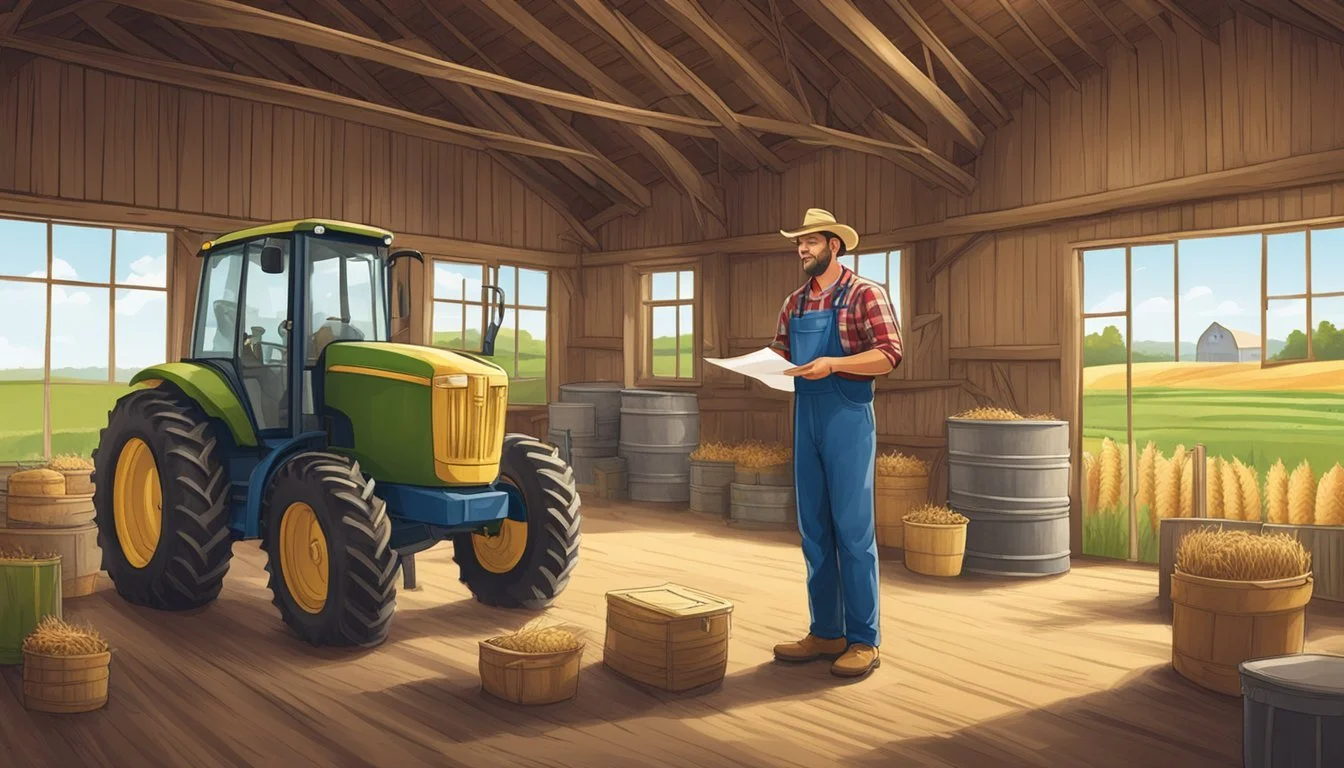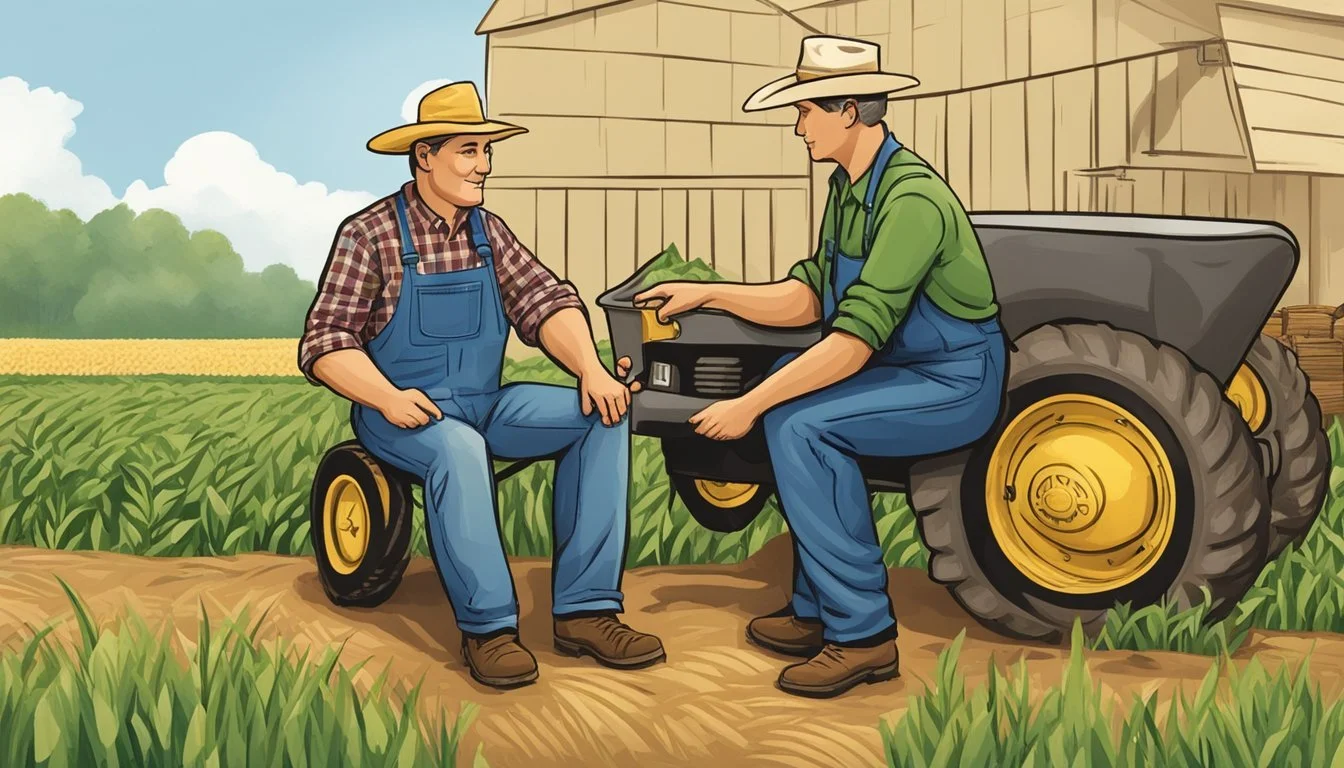Farm Loans in Wisconsin
Navigating Options and Opportunities
This Article is Part of Our Guide on Farm Loans for All 50 U.S. States
Wisconsin is a pivotal state in America's agricultural sector, contributing significantly to the dairy, corn, and soybean industries, among others. To support the growth and sustainability of its agriculture, a range of farm loans are available to farmers, ranchers, and forest landowners across the state. These financial tools are tailored to meet the diverse needs of Wisconsin's agricultural community, enabling the purchase of land, equipment, and supplies necessary for starting, expanding, or maintaining farming operations.
The federal government, through the USDA Farm Service Agency (FSA), plays a key role in providing financial assistance programs. These programs include loans for farm ownership, operating costs, and microloans designed for smaller farming operations. Furthermore, the Inflation Reduction Act has led to the creation of additional financial assistance programs aimed at rectifying past discrimination in USDA farm lending.
Within the state's boundaries, various institutions offer government-secured agricultural loans. These loans come with competitive interest rates, and some even provide patronage dividends, exemplifying a strong support system for Wisconsin's farming enterprises. With the twin pillars of federal backing and state-level support, Wisconsin's agricultural industry is well-equipped with financial resources to thrive in a competitive market environment.
Understanding Farm Loans
When considering farm loans in Wisconsin, it's essential to understand the different types available, the loan application process, and the specific programs offered by the Farm Service Agency (FSA). Good financing can be pivotal in starting, expanding, and maintaining farm operations.
Types of Farm Loans
There are various farm loans tailored to meet the needs of farmers and ranchers in Wisconsin. These include:
Farm Operating Loans: These loans are designed to cover operating expenses such as purchasing livestock, feed, seed, equipment, and fertilizers.
Farm Ownership Loans: These loans provide funds for purchasing land, making farm improvements, and constructing buildings.
Microloans: A subset of the FSA loans, microloans offer smaller amounts of funding tailored for small-scale farms.
Ag Loans: General agricultural loans that may cover both operating costs and farm ownership needs.
Loan Application and Approval Process
To apply for a farm loan, individuals must approach the lending institution with a comprehensive business plan that outlines the intended use of funds and demonstrates the farmer’s ability to repay the loan. The application process typically involves:
Credit Assessment: A review of the applicant’s credit history to ensure they meet the lender’s requirements.
Completion of Application Forms: Including personal, financial, and farm business information.
Loan Assistance Tool: The FSA provides an online tool to help farmers understand their financing options.
Loan approval is contingent on qualifying criteria established by each lending program.
FSA Loans and Programs
The FSA offers several loan programs with the aim of supporting farmers and ranchers:
Direct and Guaranteed Loan Programs: These programs provide government-backed financing to farmers who may not qualify for conventional loans.
Program Interest Rates: Interest rates for FSA loans are competitive and established by the agency.
Beginning Farmer Loans: Aimed at encouraging the next generation of farm operators, these loans offer favorable terms to new entrants in farming.
The U.S. Department of Agriculture (USDA) supports agricultural lending by guaranteeing loans and providing direct lending through the FSA. Online services like "Pay My Loan" on farmers.gov improve accessibility for borrowers, streamlining the payment process for USDA farm loans.
Eligibility and Requirements
This section provides a detailed outline of the prerequisites necessary for Wisconsin farmers seeking financial assistance through farm loans. It delineates the specific criteria set forth by the Farm Service Agency (FSA) to ensure that applicants such as family farmers, ranchers, and beginning farmers understand the eligibility and credit requisites essential for loan approval.
Loan Eligibility Criteria
Eligibility for FSA loans is markedly targeted at beginning farmers and ranchers in Wisconsin who aim to start, expand, or maintain a family farm. They gain an advantage with programs like the Direct Farm Ownership Down Payment Loan, specifically fashioned to assist newcomers in the agricultural sector. To qualify for such loans, an applicant must meet the following conditions:
First-time applicant: They should not have operated a farm or ranch for more than 10 years.
Ownership share: They must ensure a substantial portion of the business operations.
Principal operator: They must be the primary individual responsible for the farm or ranch operations.
Moreover, applicants are encouraged to develop a credible farm business plan, shaping their farming objectives, which stands as a testament to their commitment to a long-term agricultural endeavour.
Credit Requirements for Approval
The attainment of a farm loan encompasses not only fulfilling eligibility criteria but also meeting certain credit stipulations that the FSA upholds to assure the financial dependability of the borrower. Credit history becomes a pivotal factor in this assessment, as it is reflective of the applicant's fiscal responsibility. Here's what the loan officer will evaluate:
Repayment ability: Demonstrable assurance that the applicant can repay the loan.
Credit history: A satisfactory record of meeting past debt obligations.
Collateral: Adequate security pledged to cover the loan amount, if necessary.
It is crucial for farmers and ranchers in Wisconsin to align themselves with these requirements, where their creditworthiness would be as vital as their eligibility to secure the needed loans.
Loan Terms and Costs
When securing farm loans in Wisconsin, applicants should be prepared for various interest rates and repayment terms, as well as upfront costs and fees associated with the loan process.
Interest Rates and Terms
Interest Rates: Interest rates for farm loans in Wisconsin can vary greatly depending on the loan product and the lender. The USDA Farm Service Agency (FSA), for instance, offers competitive interest rates that are often below market level. These rates can be fixed or variable, with the term of the loan influencing the rate offered.
Loan Terms: Terms for farm loans can range up to 20 years, as indicated by USDA regulations. The loan term affects both the interest rate and the size of the payments. Longer terms usually mean smaller payments, but also result in more interest paid over the life of the loan.
Loan Costs and Fees
Loan Costs: Borrowers can expect to encounter several costs when applying for a farm loan. These typically include but are not limited to:
Application fees
Appraisal fees
Closing costs
Fees:
Closing Costs: Are a significant part of the loan expenses and could encompass title searches, insurance, legal fees, surveys, and more.
Loan Application: While some loan programs might waive application fees, others may charge a non-refundable fee as part of the cost to process the loan application.
Borrowers should always review the lender's fee structure and closing costs carefully to understand the full financial commitment before proceeding with the loan application. Remember, affordability and budget alignment are key when considering long-term financial commitments such as farm loans.
Specialized Loan Types
In Wisconsin, farmers have access to an array of specialized loan types designed to support various facets of agricultural operations. These loans cater to emergency situations, new and small-scale farmers, and even provide opportunities for youth involvement in agriculture.
Emergency and Disaster Assistance Loans
Farmers faced with unexpected crises resulting from natural disasters can seek help through Emergency and Disaster Assistance Loans. These loans are crucial for recovery, often providing the necessary funds to replace or repair damaged property, cover production costs, and pay essential family living expenses. They are designed to assist with losses that other insurance or funding sources do not cover.
Eligibility: Affected by natural disaster
Use of Funds: Repair, recovery, essential expenses
Loans for Beginning and Small Farmers
Guaranteed loans and microloans are crucial parts of the support system for small and beginning farmers in Wisconsin. Guaranteed loans are facilitated by the USDA but issued through local lenders, providing backing to lessen the risk for lenders. Microloans, a more accessible option, offer smaller amounts with less stringent requirements and are tailored to meet the needs of new and smaller operations with simpler financial needs.
Guaranteed Loans: Backed by USDA, facilitated by local lenders
Microloans: Smaller amounts, less stringent requirements
Youth Loan Opportunities
Youth loans are an innovative program aimed at the younger generation looking to kick-start their agricultural projects. These loans allow individuals aged 10 to 20 to finance educational agricultural projects, nurturing responsibility and providing a stepping stone into the world of farming. Substantial for personal development and future career foundations, they're integral in fostering the next generation of Wisconsin's agribusiness leaders.
Age Requirement: 10 to 20 years old
Purpose: Educational agricultural projects
Managing Farm Finances
Effective management of farm finances in Wisconsin is crucial for the sustainability and growth of agricultural operations. Farmers must navigate various financial tools to manage day-to-day operations, refine existing debt structures, and invest in growth opportunities.
Operating Loans for Day-to-Day Expenses
Operating loans are essential for Wisconsin farmers needing to cover immediate and short-term expenditures. These loans provide the necessary capital to purchase seed, livestock, and equipment needed for crop production and animal husbandry. They are also utilized to manage farm operating costs and family living expenses. Lenders offering operating loans assess the farmer's ability to generate income throughout the year to ensure timely loan repayment.
Refinancing Existing Debt
Farmers often consider refinancing as a strategy to improve their financial position. Refinancing existing loans can potentially lower interest rates and monthly payments, providing farmers with more liquidity. Debt refinancing in the agricultural sector allows for the reallocation of resources, with an aim to transition into loans with better terms and reduce financial stress.
Investing in Farm Expansion and Modernization
Investment in the expansion and modernization of farms is a key driver for the future success of the agricultural industry. This often involves acquiring additional farmland or investing in new equipment. Loans for expanding operations are critical as they enable farmers to scale their production and meet the growing demands of the market. Modernization loans are focused on adopting new technologies and practices that improve efficiency and yield. These investments in farm plus assets can ensure long-term viability and increased competitiveness in the agricultural sector.
Farm Property and Infrastructure
Farm loans in Wisconsin offer vital financial support for the acquisition and improvement of farmland and buildings, a cornerstone for building a robust agribusiness infrastructure.
Investment in Land and Buildings
Farm Service Agency (FSA) loans present opportunities for farmers to acquire farmland, ensuring the preservation and expansion of agricultural operations in Wisconsin. Prospective farmers can utilize Farm Ownership loans to procure land, while existing farmers can leverage these funds to enlarge and improve their properties. Mortgages issued through these loans are commonly used by farmers to:
Purchase new farmland.
Construct, repair, or improve farm buildings.
FSA loans aim to bolster agricultural productivity and secure farmland for future generations, with a dedicated borrowing cap designed to support these ventures.
Purchasing Farm Equipment and Supplies
To sustain daily operations, farmers depend on various types of farm equipment such as tractors, and on essential supplies including feed and fuel. Operating loans from the FSA are tailored to assist with these purchases. Here's how farmers can benefit:
Farm Equipment: Loans can finance the purchase of essential machinery like tractors, providing the means to modernize and increase efficiency.
Farm Supplies: Borrowers can apply loan funds for the acquisition of necessary supplies, from livestock feed to fuel, sustaining their farm's operations.
The focus of these loans is to finance the direct costs tied to running a farm, encompassing both equipment and operational supplies crucial for an efficient agribusiness.
Resources and Support for Farmers
In Wisconsin, farmers seeking to establish or expand their operations have access to a spectrum of resources and support systems. Key offerings include extensive educational programs and a suite of financial services tailored to the agricultural sector.
Educational Resources and Outreach
Farmers have the opportunity to benefit from a variety of educational resources aimed at enhancing their agricultural expertise. Services such as farmers.gov and local USDA Service Centers play pivotal roles in providing relevant information and personalized guidance. Individuals interested in educational agricultural projects can engage with programs offered by 4-H clubs and the Future Farmers of America (FFA)—organizations committed to the development of agricultural education.
Farmers.gov: A comprehensive resource for up-to-date agricultural practices, insurance options, and land management.
USDA Service Centers: They offer face-to-face assistance to farmers, helping to explain USDA programs and services.
4-H Clubs: Provide hands-on learning experiences in agricultural science.
FFA: Paves the path for leadership and personal growth through agricultural education.
Financial Planning and Services
Financial planning is critical for farmers to succeed and remain competitive. The Farm Service Agency (FSA) offers various Farm Loan Programs that can be accessed via the Farm Loan Discovery Tool or directly through a Farm Loan Officer. Programs are crafted to assist with operating costs, market expansion, and the sustenance of family farms.
These are some focal areas of the financial support provided:
Operating Loans: Help with normal operating or family living expenses.
Market Opportunities: Assistance with accessing new markets and marketing opportunities.
Loan Accessibility: The Loan Discovery Tool simplifies the eligibility check and application process.
Service Description Farm Loan Discovery Tool An online resource to determine loan eligibility and streamline the loan application process. Farm Loan Officer Offers specialized guidance on loan options tailored to farmers' needs. FSA Loan Programs Include direct and guaranteed loans for a variety of purposes.
Harnessing these educational and financial resources will help Wisconsin farmers navigate the complexities of farm management and support their continued growth in the field.
Agricultural Policy and Future Outlook
Wisconsin's agricultural sector is navigating a complex financial landscape as it adjusts to latest policies and market trends.
Impact of Recent Legislation
The Inflation Reduction Act stands as a significant piece of legislation affecting Wisconsin farmers. It has provisions aimed at bolstering rural development and providing financial support for climate-smart agricultural practices. Farmers are keenly observing how these measures will translate to practical benefits, such as grants or subsidies, which could alleviate the financial pressures they are currently facing.
Trends in Agricultural Financing
Agricultural lenders are witnessing a shift in the financing environment. Interest rates are rising, leading to increased borrowing costs for farmers. Despite this, there is a trend of declining loan balances, attributed to farmers' strategic financial management during profitable periods.
Rising production expenses
Government aid alongside market-driven income affecting loan balances
Lenders remain cautious but are still prepared to offer agriculture loans that support the industry's needs. The outlook suggests that farmers must continue to adapt to a changing economic environment, leveraging available financial tools and resources.
Regional Considerations in Wisconsin
In the context of agricultural financing, Wisconsin's dynamic environmental conditions and its status as a dairy powerhouse must be carefully assessed by farmers when seeking loans.
Local Climate and Soil Conditions
Wisconsin's climate varies significantly from the Lake Superior shoreline to the interior highlands, affecting soil and water resources crucial for farming. Farmers in these regions must consider the local soil type and climate, as they can greatly influence productivity. For instance, soils in the Central Plains may require different management practices than those in the Northern Highlands, to capitalize on periods of optimal plant growth and ensure sustainable water usage.
Support for Wisconsin's Dairy Industry
The dairy industry in Wisconsin is a vital sector, with Wisconsin farmers known as leading dairy producers in the nation. Financial programs and farm loans specifically tailored to support the dairy industry are available, aiming to assist in the purchase of livestock, feed, and necessary equipment. In areas like Madison, agricultural loan services may also offer enhanced guidance to optimize production processes and meet the specific needs of dairy operations, reinforcing the state's reputation as "America's Dairyland."









